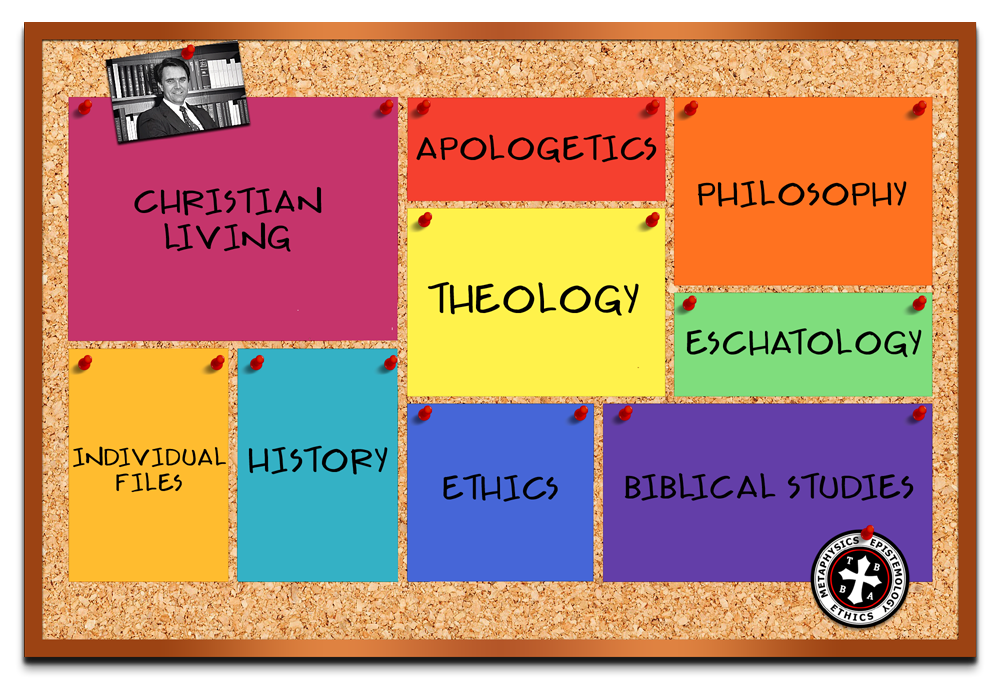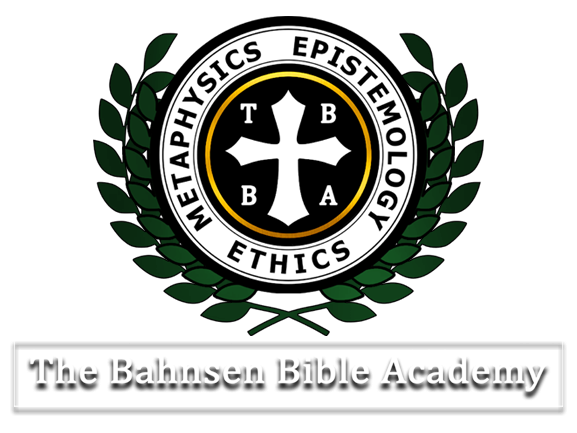“Forgive us for so often having vain resolves to change our lifestyle and priorities and to study Your Word and then never follow it through. Forgive us and give us Your Spirit that today those resolutions we make will truly be kept. Help us to get up and to GET STARTED, and to begin a lifelong journey of knowing You better because we’ll live with You forever.”
– Dr. Greg L. Bahnsen –

“Greg L. Bahnsen, (1948-1995), was an ordained minister in the Orthodox Presbyterian Church and a full time Scholar in Residence for the Southern California Center for Christian Studies. He received his Ph.D. in philosophy from the University of Southern California, specializing in the theory of knowledge. He previously received the B.A. (magna cum laude, philosophy) from Westmont College, and then simultaneously earned the M.Div. and Th.M. degrees from Westminster Theological Seminary. Dr. Bahnsen lectured to a broad range of evangelical Christian groups at many colleges and conferences.
He was an experienced apologist and debater, a clear and cogent teacher of the Christian worldview who was devoted to training believers in understanding and applying the Christian faith to every area of life. He published numerous scholarly articles, a number of well-known books, and has over 1,500 recorded lectures and sermons. NOTE: While Dr. Bahnsen died on December 11th, 1995, his audio tapes and written materials were, and still remain, the foundation for Covenant Media Foundation’s ministry.” —CMF
This series of Sunday School lessons by Dr. Bahnsen explains what it means to be a disciple of Christ-to learn of Him and abide in His word. This means, very practically, that disciples should know how to study their Bibles effectively.
Ethics from the Christian perspective involves the exploration and application of moral principles and values based on biblical teachings and theological doctrines. It encompasses the study of what is considered right or wrong, good or evil, and the pursuit of virtuous living in accordance with God’s will as revealed in Scripture. MORE
History is viewed as the unfolding of God’s plan for humanity, with divine providence guiding the course of events. Central to this perspective is the belief that God is actively involved in human affairs, shaping the destinies of nations and individuals according to His purposes.
In Christian history, the story of redemption is paramount, beginning with God’s creation of the world and culminating in the life, death, and resurrection of Jesus Christ. The OldCovenant recounts God’s covenant relationship with the nation of Israel/the Church and the fulfillment of His promises through its history.
Christian history also encompasses the spread of Christianity from its origins in the first-century Roman Empire to becoming a global faith, influencing cultures, societies, and civilizations throughout the ages. Key events such as the early church’s expansion, the conversion of Constantine, the Protestant Reformation, and missionary movements are pivotal moments in Christian history. MORE
These audio files consists of lectures and sermons from the Apologetics, Ethics, Theology, and Church & Christian Living categories.
A featured subject among them is Dr. Bahnsen’s lectures on Theonomy (The Law of GOD)
Dr. Van Til taught us that “There is no alternative but that of theonomy and autonomy” (Christian-Theistic Ethics, p. 134). Every ethical decision assumes some final authority or standard, and that will either be self-law (“autonomy”) or God’s law (“theonomy”). While unbelievers consider themselves the ultimate authority in determining moral right or wrong, believers acknowledge that God alone has that position and prerogative.
The position which has come to be labeled “theonomy” today thus holds that the word of the Lord is the sole, supreme, and unchallengeable standard for the actions and attitudes of all men in all areas of life. Our obligation to keep God’s commands cannot be judged by any extra-scriptural standard, such as whether its specific requirements (when properly interpreted) are congenial to past traditions or modern feelings and practices. (Greg Bahnsen, What Is Theonomy?) MORE
Central to Christian living is the pursuit of holiness and sanctification, which involves being set apart for God’s purposes and growing in conformity to the image of Christ. Christians are called to cultivate virtues such as patience, kindness, forgiveness, and gratitude, and to resist temptations and sinful behaviors that hinder spiritual growth and relationship with God. MORE
“The very reason why Christians are put in the position of giving a reasoned account of the hope that is in them is that not all men have faith. Because there is a world to be evangelized (men who are unconverted), there is the need for the believer to defend his faith: Evangelism naturally brings one into apologetics. This indicates that apologetics is no mere matter of “intellectual jousting”; it is a serious matter of life and death – eternal life and death. The apologist who fails to take account of the evangelistic nature of his argumentation is both cruel and proud. Cruel because he overlooks the deepest need of his opponent and proud because he is more concerned to demonstrate that he is no academic fool that to show how all glory belongs to the gracious God of all truth. Evangelism reminds us of who we are (sinners saved by grace) and what our opponents need (conversion of heart, not simply modified propositions). I believe, therefore, that the evangelistic nature of apologetics shows us the need to follow a presuppositional defense of the faith. In contrast to this approach stand the many systems of neutral autonomous argumentation.” (Greg Bahnsen, Evangelism and Apologetics) – MORE
“Beware lest any man spoil you through philosophy and vain deceit, after the tradition of men, after the rudiments of the world, and not after Christ.” – Col 2:8. Unlike secular philosophy, which may seek answers independently of religious frameworks, Christian philosophy integrates faith-based principles, Scripture, and theological teachings into its inquiries.
One central aspect of Christian philosophy is the exploration of the nature and attributes of God. Philosophical arguments for the existence of God, such as the cosmological, teleological, and ontological arguments, are often examined and debated within Christian philosophical circles. Additionally, Christian philosophers delve into the problem of evil and suffering, seeking to reconcile the existence of these with the concept of a loving and all-powerful God. MORE
Eschatology is the theological study of the last things or the end times, focusing on the ultimate destiny of humanity, the world, and the fulfillment of God’s purposes in history. It delves into biblical prophecies, theological doctrines, and beliefs regarding the final judgment, resurrection, and the establishment of God’s kingdom.
Christian eschatology serves as a source of hope, assurance, and motivation for believers, reminding them of the ultimate triumph of God’s kingdom over evil and the promise of eternal life in Christ. It inspires Christians to live faithfully in the present, anticipating the fulfillment of God’s purposes and the coming of the new heavens and the new earth. MORE
The ultimate goal of Christian Bible study is spiritual formation and discipleship, as believers seek to grow in knowledge, wisdom, and maturity in Christ. It aims to equip individuals for faithful living, service, and ministry in the world, empowering them to live out their faith with courage, compassion, and integrity.
Christian Bible study is not merely an academic exercise but a spiritual discipline and a means of encountering God’s truth and grace. It is a lifelong journey of exploration, discovery, and transformation, as believers engage with God’s word and allow it to shape their beliefs, values, and actions in accordance with the teachings of Jesus Christ. MORE
Theology is the systematic study and exploration of God, his nature, attributes, and relationship with humanity, as revealed in scripture and Christian tradition. It encompasses the investigation of fundamental beliefs, doctrines, and teachings of the Christian faith, as well as the exploration of theological questions and concepts.
Central to Christian theology is the belief in the Triune nature of God—Father, Son, and Holy Spirit—as revealed in the doctrine of the Trinity. Christians affirm the unity of God in three persons, each with distinct roles and functions in the economy of salvation, as revealed in the New Testament.
Christian theology also emphasizes the authority of scripture as the inspired word of God, containing divine revelation and guidance for faith and practice. The Bible serves as the primary source and norm for Christian theology, providing insights into God’s character, will, and plan of redemption through Jesus Christ. MORE
…Need more help getting started? Explore some of the popular issues here:
Autoplay may be paused for accessibility. Use dots or grab and move pictures to browse.

The Bahnsen Bible Academy would like to acknowledge the work of Covenant Media Foundation, The Bahnsen Institute, and Sermon Audio, of which a large portion of this site is made possible only due to their online presence. If you have a blog or website, consider embedding their materials to help educate others in The Faith. Also, please consider supporting their work in our collective effort to share the Gospel, encourage each other, and make disciples of all nations. Matt28:15-20.
The Bahnsen Bible Academy is a study resource built around the teaching ministry of Dr. Greg L. Bahnsen. If you’d like more information of what this site is and how to use it, go here:
What Is the Bahnsen Bible Academy?

The Bahnsen Bible Academy comes along your side to help you study Scripture through sermon outlines, remastered audio lectures, articles, and video timestamps for easy navigation.
Join us on social media
The Bahnsen Bible Academy is an independent educational ministry dedicated to biblical foundations, apologetics, and cultural analysis grounded in the Christian worldview. It is not officially affiliated with or operated by the estate of Dr. Greg L. Bahnsen.
You have successfully joined our subscriber list.
“…I counsel you to not read your Bible from cover to cover; but, I would also say to read everything in it.”
— Dr. Greg Bahnsen —
Sign up to get a clear understanding of The Scriptures.
The Bahnsen Bible Academy | Copyright © 2026